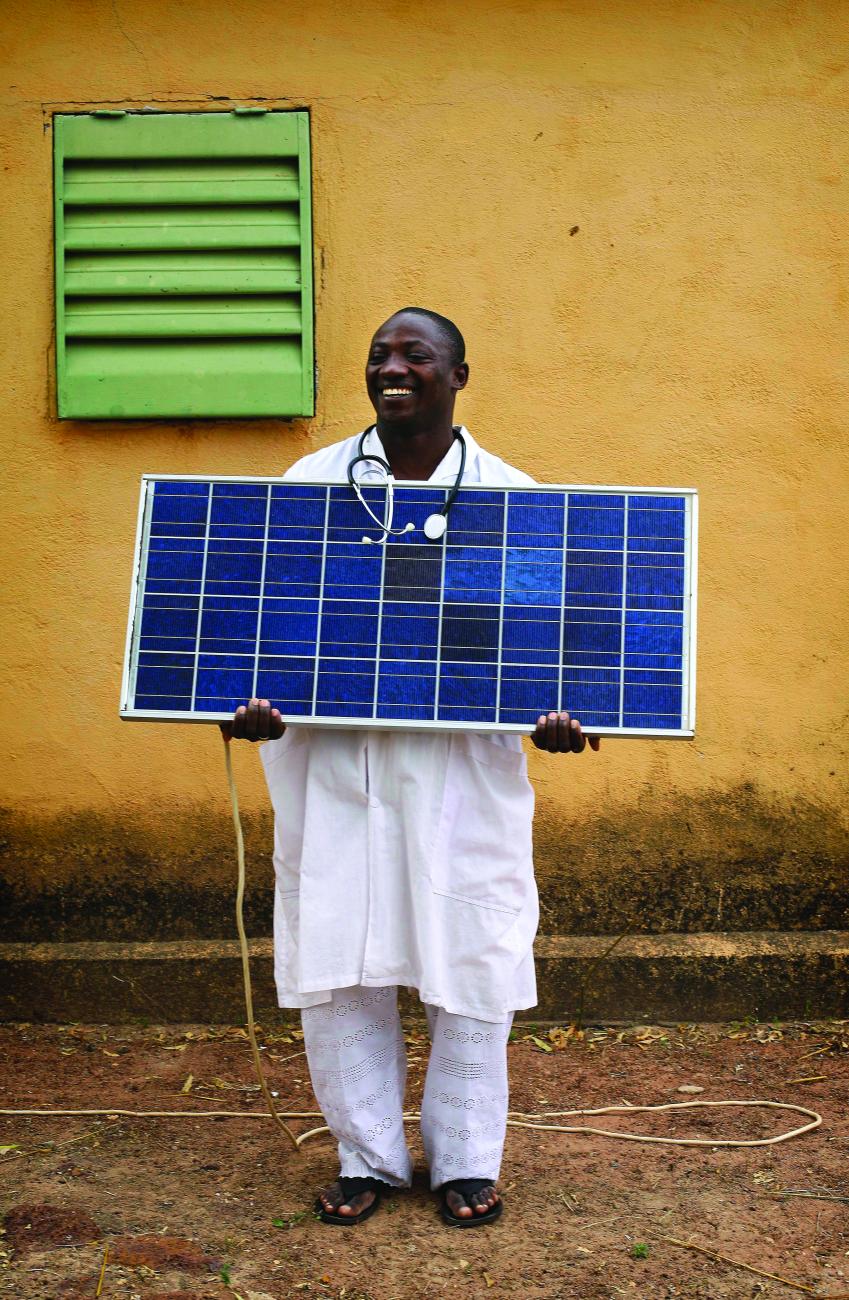The Health Care Climate Challenge has over 350 participants, representing the interests of more than 26,000 hospitals and health centers in 43 countries.

"As the only sector with healing as its mission, health care has an opportunity to use its ethical, economic, and political influence to be a leader in climate solutions"
It's easy to get started
1) Join the challenge.
Hospitals, health systems, and health care facilities are invited to sign the Health Care Climate Challenge pledge.
2) Access our resources
Health Care Climate Challenge provides participants with easy-to-use resources to help support climate-smart solutions.
3) Report your progress
We make it easy to record and report your data to track your progress.
1) Sign the pledge

The Health Care Climate Pledge
We pledge to do our part to meet the challenge posed by climate change – a test perhaps as great as human civilization has ever known – by taking the following steps:
- Reduce our own climate footprint: Our collective vision is to reduce our health care systems’ emissions, moving toward low-carbon, and ultimately, carbon-neutral health care. Many hospitals are major energy consumers and can make large reductions in greenhouse gas emissions. Other hospitals and health systems are energy-starved and can deploy renewable energy to foster greater access to health care and better health outcomes. We pledge to lead the way toward low-carbon health care by setting greenhouse gas reduction targets. We will work to implement energy efficiency measures and, when feasible, deploy clean renewable energy to power our buildings. We will measure and report on our progress, including financial savings related to these actions. We will also seek to identify our institutions’ other climate impacts, including transportation systems, use of anesthetic gases, purchasing policies, waste generation, and disposal. We will develop and implement plans to reduce these impacts as well.
- Prepare for climate impacts: In order to serve our communities, hospitals and health centers need to remain operational during and after an extreme weather event. We need to understand, anticipate, and be equipped to manage the health needs of our immediate community and prepare for shifting disease patterns. We pledge to prepare for the impacts of climate change by becoming more resilient to increasing incidents of extreme weather. We will work to implement a series of measures to assure our physical infrastructure, staff, and communities are prepared for the immediate impact of extreme weather events and the longer-term impacts of changing patterns of disease, as well as other climate impacts, combining these efforts with low-carbon solutions when possible.
- Lead the way to a low-carbon future: As health care providers respected by local communities, government and business, we commit to provide leadership in our societies for a healthy climate. We pledge to do so by educating health care professionals and hospital staff, as well as the communities we serve, on challenges and solutions related to climate and health. We also pledge to encourage public policy, economic development, and investment strategies that move our societies away from fossil fuel dependency and foster instead a healthy energy future, thereby protecting local and global health from fossil fuel combustion and climate change.
By moving toward climate-smart, low-carbon health systems, health care can mitigate its own climate impact, save money, and lead by example. By becoming more resilient, health care can help prepare for the growing impacts of climate change. And by providing societal leadership, we can help forge a vision of a future with healthy hospitals and healthy people living on a healthy planet.
2) Access our resources
After enrolling, the Health Care Climate Challenge provides participants with easy-to-use resources to help support climate-smart solutions.
Download the Health Care Climate Challenge information packet for details on the challenge and how your organization can participate.
Climate Challenge talking points for leadership
- The opportunity to improve patient/community health outcomes: By mitigating and reducing carbon emissions, health care facilities can directly improve the health of their patients and communities.
a. Air pollution causes 200,000 early deaths in the U.S. each year.
b. Moving to cleaner energy, the EPA estimated its Clean Power Plan’s climate and health benefits worth $55 billion to $93 billion in 2030, including avoiding 2,700 to 6,600 premature deaths and as many as 150,000 asthma attacks in children. - The opportunity for financial savings: By mitigating and reducing their carbon emissions, health care facilities are becoming increasingly energy efficient, resulting in energy cost savings.
a. Example from the Climate Action Playbook: Ascension’s environmental stewardship program met the Better Buildings Challenge goal of 20 percent energy reduction by 2020 across its acute care hospital portfolio. More than three years ahead of their plan, Ascension reduced energy use by 21 percent, saved $53.3 million in cost avoidance and reduced over 1.1 million tons carbon dioxide emission across 141 health care facilities. - The opportunity for hospitals to be anchor institutions for their community: As anchor institutions, hospitals can embrace a commitment to use their social and economic influence and intellectual resources to better the long-term public and environmental health of their communities.
a. Example from the Climate Action Playbook: Partners HealthCare designed and constructed its Spaulding Rehabilitation Hospital to maintain uninterrupted operations through extreme weather events and to accommodate projected sea level rise.
We Are Still In talking points for leadership
The health care sector should be a leading voice in the growing We Are Still In coalition.
- By signing the We Are Still In pledge, you join a large, diverse coalition made up of more than 2,800 leading companies, investors, colleges and universities, faith groups, along with major U.S. cities and 11 states.
- The We Are Still In pledge will be featured during the Global Climate Action Summit giving health care an opportunity to clearly communicate its leadership on climate to the world.
- Health systems can demonstrate their commitment to climate solutions by standing with the many other corporations, colleges, and universities that are stepping up.
- The health care voice is critical to communicating the need for climate action to the public, and governors, mayors, and businesses are eagerly seeking additional health care leaders to sign on.
- By signing you do not commit to any specific action or reporting requirement. Rather, this is a public messaging strategy that shows the unity of the U.S. private sector and city and state governments in committing to the Paris Agreement.
- There are already nine health systems signed on including: Catholic Health Initiatives, Dignity Health, Hackensack Meridian Health, Mercy Health, Oregon Health & Science University, Providence St. Joseph Health, Trinity Health, University of Vermont Medical Center, and Virginia Mason Memorial - Virginia Mason Medical Center and Yakima Valley.
- Once we have enough hospitals signed on, “health care” will receive its own section on the website (similar to higher education), thus elevating our sector’s climate leadership.
An easily shareable PDF file of the pledge text
From an individual to a hospital
Dear <<Name of Hospital Administrator>>,
As a patient of your hospital and a community member, I am writing to encourage you to join the Health Care Climate Challenge. I am concerned about the impact climate change is having on the health of my family, neighbors, and community.
The health impacts of climate change are already being felt across the United States. The impacts include increased insect-borne and heat-related illnesses; food and water scarcity; and injuries, deaths, and mental health impacts from more frequent extreme weather events. It is urgent that hospitals take steps to prepare for these impacts and build community resilience.
At the same time, the health care sector in the United States contributes 10 percent of the total greenhouse gas emissions in the United States. As guardians of community health, hospitals have both a responsibility and opportunity to act.
Will <<Name of Hospital>> pledge to reduce its carbon footprint, prepare for climate impacts, and lead the way to the low-carbon future by joining the Health Care Climate Challenge? The Climate Challenge provides hospitals with easy-to-use resources to help support climate-smart solutions.
Thank you for considering participating in the Health Care Climate Challenge, an opportunity for <<Name of Hospital>> to play a critical role in protecting the health of our community.
Sincerely,
<<Name and City/Town>>
From hospital staff to hospital leadership
Hospital staff can customize this template and send an email to their leadership making the case for joining the Health Care Climate Challenge.
Dear <<name of hospital administrator>>,
As someone who sees patients every day in the <<name of department>>, I am concerned about the impact climate change is having on the health of our patients and community.
In order to ensure we are honoring our healing mission and doing our part to protect our patients and community, I would like to propose that our hospital join the Health Care Climate Challenge.
The health impacts of climate change are already being felt across the country. These impacts include increased respiratory and cardiovascular disease, injuries and premature deaths related to extreme weather events, changes in the prevalence and geographical distribution of infectious diseases, and impacts on mental health. In my own practice I am seeing more patients suffering from <<describe specific impacts>>.
At the same time, hospital operations have a significant environmental footprint making up nearly 10 percent of total greenhouse gas emissions in the United States. It’s vital that our hospital take steps to reduce our emissions so we do not contribute to the illnesses we are trying to treat.
Investing in energy efficiency and clean energy can also generate significant financial savings for our hospital. Every $1 a nonprofit health care organization saves on energy is equivalent to generating $20 in new revenue.
Recent extreme weather events also demonstrate the need to invest in hospital and community resilience. The report Safe haven in the storm: Protecting lives and margins with climate-smart health care shows how hospitals can prevent loss and damages by investing in preparedness.
The Health Care Climate Challenge will provide our hospital with the tools and resources we need and connect us to other hospitals doing this work.
I would like to schedule a time to talk with you more about our hospital’s participation in the challenge. What time would be most convenient for you?
Sincerely,
<<name, title, department>>
3) Report your progress
For Practice Greenhealth members who participate in the Environmental Excellence Awards program, data can be automatically uploaded from the Climate page. Health systems that do not submit 60% or more of their facilities and hospitals that do not submit through awards will be asked to submit data in the Hippocrates data system or using an offline form.
Working on reducing a hospital or health system’s climate impact doesn’t happen in a silo. This is why our most successful, leading health systems are part of the Practice Greenhealth network, where they learn about and share various strategies for mitigation, resilience, and leadership.
